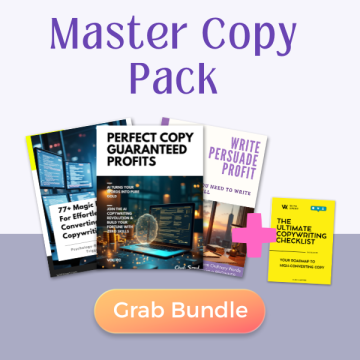Who needs copywriting? The answer might surprise you. Every business and professional who wants to sell products or services needs effective copywriting. Copywriting transforms ordinary words into persuasive messages that drive action. It helps brands connect with audiences and convert interest into sales. This article explores who benefits from copywriting and why it matters for your success.
What is copywriting and why it matters
Copywriting is the art of writing text for marketing and advertising purposes. It aims to persuade readers to take specific actions like buying products or subscribing to services. Copywriters craft compelling messages that resonate with target audiences and drive conversions.
Unlike content writing that educates and informs, copywriting focuses on selling and persuading. Content writing builds trust over time, while copywriting drives immediate action. Both serve different purposes in your marketing strategy.
Great copy influences how customers perceive your brand and products. It shapes your brand voice and helps you stand out from competitors. Effective copywriting boosts conversion rates, increases sales, and improves marketing ROI.
Discover also: Can Copywriting Make You a Millionaire?
Businesses that thrive with professional copywriting
Small and large businesses
Every business needs persuasive copy to communicate value to potential customers. Your website must clearly explain what you offer and why people should choose you. Ads require concise, compelling messages that grab attention in crowded spaces.
Email marketing depends on engaging subject lines and persuasive content to drive opens and clicks. Social media posts need snappy, engaging copy that stops scrollers and encourages engagement.
Well-crafted copy helps businesses establish credibility and build trust with their audience. It transforms features into benefits that customers can visualize and desire. Great copy answers customer questions before they ask and addresses objections proactively.
E-commerce stores and product sellers
Online stores live or die by their product descriptions and sales pages. Detailed, benefit-focused descriptions help customers imagine owning your products. They bridge the gap between physical shopping experiences and digital browsing.
Abandoned cart emails with compelling copy can recover lost sales and boost revenue. Product launch sequences build anticipation and create demand before items become available.
Great copy helps e-commerce businesses differentiate similar products from competitors. It justifies price points by highlighting unique value propositions and quality differences. Persuasive checkout page copy reduces hesitation and increases conversion rates.
Coaches, consultants, and course creators
Service providers must clearly communicate their expertise and results they deliver. Landing pages need to establish credibility and showcase transformation possibilities for clients. Webinar scripts must balance valuable information with compelling offers.
Email sequences help nurture leads who aren’t ready to buy immediately. They build relationships over time and demonstrate value before asking for sales. Sales page copy must overcome objections and create desire for transformation.
Testimonials and case studies need strategic framing to highlight the journey clients experience. Application forms and discovery call invitations require copy that qualifies prospects effectively. Follow-up messages need persuasive elements that maintain momentum toward closing sales.
Personal brands and influencers
Influencers need engaging captions that stop scrolling and encourage meaningful engagement. Your bio must quickly communicate your unique value and attract the right followers. Call-to-actions determine whether followers take the next step with your brand.
Personal brands require consistent voice and messaging across all platforms. Your copy should reflect your personality while remaining professional and strategic. Collaboration pitches need persuasive elements that showcase mutual benefits for potential partners.
Effective copy helps influencers monetize their audience through product recommendations and offers. It builds authentic connections while strategically guiding followers toward business objectives. Great copy balances relatability with authority in your specific niche.
Startups and SaaS companies
Tech companies need clear explanations of complex products in simple, benefit-focused language. Website copy must quickly communicate value propositions to impatient visitors. Explainer videos require scripts that simplify technical concepts without losing accuracy.
Onboarding emails help new users understand and appreciate product features. They reduce churn by ensuring customers extract maximum value from their purchase. Free trial conversion messages need compelling reasons to become paying customers.
Feature announcement copy should highlight benefits rather than technical specifications. Pricing page copy must justify costs by emphasizing value and return on investment. Growth hacking campaigns require persuasive elements that encourage viral sharing.
Nonprofits and charities
Charitable organizations need emotional storytelling that inspires action without manipulation. Donation appeals must create urgency while maintaining organizational integrity. Impact reports require copy that demonstrates effectiveness and builds donor trust.
Volunteer recruitment messages need compelling reasons for people to donate their time. Event promotions must generate excitement and clearly communicate participation benefits. Grant applications require persuasive elements that showcase organizational strengths.
Effective nonprofit copy balances emotional appeals with factual information about impact. It creates connection between donors and beneficiaries through powerful storytelling. Great copy helps transform one-time donors into recurring supporters through relationship building.
Discover also: Free Copywriting Books to Master Persuasive Writing
Who benefits from learning copywriting skills
Business owners and entrepreneurs
Entrepreneurs who understand copywriting principles make better marketing decisions. They communicate more effectively with customers and team members. They save money by handling basic copy needs without hiring specialists.
Business owners with copywriting skills can better evaluate freelancers and agencies. They know what good copy looks like and can provide useful feedback. They maintain consistent brand voice across all customer touchpoints.
Startup founders can create compelling pitch decks and investor presentations. They craft better networking messages and business development outreach. They write more persuasive proposals and partnership agreements.
Marketers and social media managers
Marketing professionals need copywriting skills to create effective campaigns across channels. They craft better briefs when working with specialized copywriters. They understand how copy integrates with design and strategy.
Social media managers write dozens of messages daily across platforms. Strong copywriting skills help them maintain engagement and drive traffic. They create more effective ad copy that improves campaign performance.
Digital marketers use copywriting for landing pages, email sequences, and PPC ads. Content marketers blend copywriting techniques with valuable information for better results. Marketing managers evaluate copy more effectively when they understand core principles.
Freelancers and aspiring copywriters
Professional copywriting offers lucrative career opportunities with flexible work arrangements. Entry-level copywriters earn competitive rates that increase with experience and results. Specialized copywriters command premium fees in high-demand niches.
Freelance copywriters enjoy location independence and diverse client experiences. Agency copywriters gain exposure to multiple industries and collaborative environments. In-house copywriters develop deep product knowledge and consistent brand voice.
The demand for skilled copywriters continues to grow across industries. Digital marketing expansion creates ongoing need for persuasive messaging. Copywriting skills remain valuable despite AI advancements in content creation.
Bloggers and content creators
Content creators who understand copywriting craft more compelling headlines and introductions. They structure content for better engagement and completion rates. They incorporate strategic calls-to-action that drive business results.
Bloggers use copywriting techniques to grow email lists and monetize audiences. YouTubers create better video titles, descriptions, and verbal calls-to-action. Podcasters write show notes and promotional copy that increases listenership.
Copywriting skills help content creators pitch sponsored content more effectively. They write better product reviews that balance authenticity with conversion. They create more compelling lead magnets and premium digital products.
Discover also: Best Generative AI for Copywriting
Getting started with copywriting fundamentals
Core copywriting frameworks
The AIDA formula guides readers through Attention, Interest, Desire, and Action. It creates logical progression toward conversion through emotional engagement. This framework works for everything from short ads to long-form sales pages.
The PAS framework identifies Problems, Agitates pain points, then offers Solutions. It taps into psychological triggers that motivate purchase decisions. This approach works particularly well for problem-solving products and services.
The BAB framework presents Before scenarios, After possibilities, and Bridge solutions. It helps readers visualize transformation through your product or service. This structure creates desire through contrast between current and ideal states.
Essential copywriting skills to develop
Research skills help you understand customer language and pain points. Interviewing customers reveals exact phrases and concerns they express. Competitive analysis identifies gaps and opportunities in market messaging.
Headline writing captures attention and encourages further reading. Benefit-focused writing transforms features into meaningful advantages for users. Storytelling creates emotional connection and memorable messaging.
Call-to-action creation guides readers toward specific next steps. Objection handling addresses concerns before they prevent conversion. Editing skills help you tighten copy and increase its impact.
Resources for copywriting improvement
Books like “Breakthrough Advertising” by Eugene Schwartz offer timeless principles. “The Copywriter’s Handbook” by Bob Bly provides practical techniques for beginners. “Building a StoryBrand” by Donald Miller offers accessible frameworks.
Online courses from platforms like Copyhackers and AWAI provide structured learning. YouTube channels like Alex Cattoni and Copywriting Course offer free tutorials. Copywriting communities provide feedback and networking opportunities.
Swipe files help you collect and analyze effective copy examples. A/B testing tools let you compare different versions for better results. AI assistants can help with research and editing while you develop skills.
Conclusion
Who needs copywriting? Everyone who wants to persuade, sell, or influence through written communication. Businesses across industries rely on effective copy to drive growth and connect with customers. Individuals benefit from copywriting skills regardless of their primary profession.
The ability to write persuasively remains valuable despite technological changes. Investing in copywriting—whether hiring professionals or developing personal skills—yields significant returns. Start applying these principles today to see how effective copywriting transforms your results.

